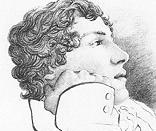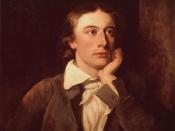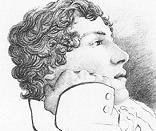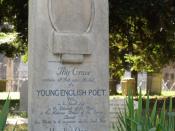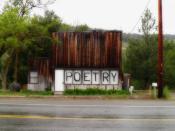This poem falls into two major thought groups:
*Keats expresses his fear of dying young in the first thought unit, lines 1-12. He fears that he will not fulfill himself as a writer (lines 1-8) and that he will lose his beloved (lines 9-12).
*Keats resolves his fears by asserting the unimportance of love and fame in the concluding two and a half lines of this sonnet.
The first quatrain (four lines) emphasizes both how fertile his imagination is and how much he has to express; hence the imagery of the harvest, e.g., "glean'd," "garners," "full ripen'd grain." Subtly reinforcing this idea is the alliteration of the key words "glean'd," garners," and "grain," as well as the repetition of r sounds in "charactery," "rich," "garners,"ripen'd," and "grain.". A harvest is, obviously, fulfillment in time, the culmination which yields a valued product, as reflected in the grain being "full ripen'd."
Abundance is also apparent in the adjectives "high-piled" and "rich." The harvest metaphor contains a paradox (paradox is a characteristic of Keats's poetry and thought): Keats is both the field of grain (his imagination is like the grain to be harvested) and he is the harvester (writer of poetry).
In the next quatrain (lines 5-8), he sees the world as full of material he could transform into poetry (his is "the magic hand")--the beauty of nature ("night's starr'd face) and the larger meanings he perceives beneath the appearance of nature or physical phenomena ("Huge cloudy symbols") .
In the third quatrain (lines 9-12), he turns to love. As the "fair creature of an hour," his beloved is short-lived just as, by implication, love is. The quatrain itself parallels the idea of little time, in being only three and a half lines, rather than the usual four lines of a Shakespearean sonnet; the effect in reading is of a slight speeding-up of time. Is love as important as, less important than, or equally important as poetry for Keats in this poem? Does the fact that he devotes fewer lines to love than to poetry suggest anything about their relative importance to him?
The poet's concern with time (not enough time to fulfill his poetic gift and love) is supported by the repetition of "when" at the beginning of each quatrain and by the shortening of the third quatrain. Keats attributes two qualities to love: (1) it has the ability to transform the world for the lovers ("faery power"), but of course fairies are not real, and their enchantments are an illusion and (2) love involves us with emotion rather than thought ("I feel" and "unreflecting love").
Reflecting upon his feelings, which the act of writing this sonnet has involved, Keats achieves some distancing from his own feelings and ordinary life, so he is able to reach a resolution. He thinks about the human solitariness ("I stand alone") and human insignificance (the implicit contrast betwen his lone self and "the wide world"). The shore is a point of contact, the threshold between two worlds or conditions, land and sea; so Keats is crossing a threshold, from his desire for fame and love to accepting their unimportance and ceasing to fear and yearn.
